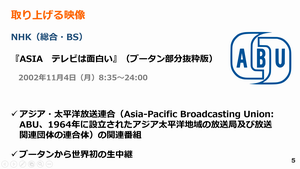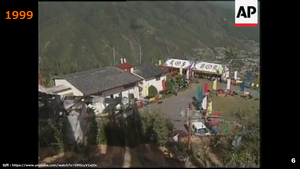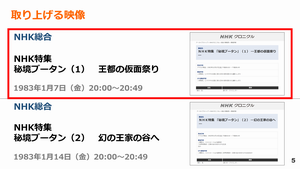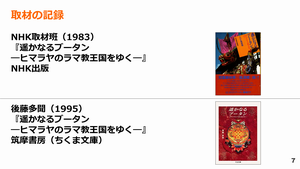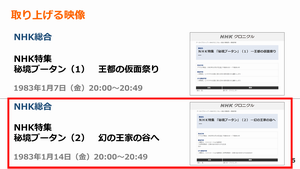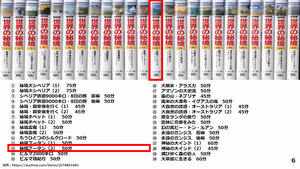- Global Collaboration Center
- Activity
- Report on the Bhutan Seminar Series 2022 (Dec.2022 & Jan.2023)
ページの本文です。
Report on the Bhutan Seminar Series 2022 (Dec.2022 & Jan.2023)
2023年4月20日更新
Beginning in FY2021, the Global Collaboration Center is hosting regional research-based seminars to (1) learn about the Kingdom of Bhutan, which is located in South Asia, and (2) examine development policies and the situation of the country and region in light of these issues. Each seminar includes a film screening, a brief commentary by the presenter, and a question-and-answer session. This year’s seminar is also an approved project of the “Japan-Southwest Asia Exchange Year 2022” by Ministry of Foreign Affairs.
15th Seminar in the Bhutan Seminar Series 2022 (2022.12.17)
In the 15th seminar, we considered the merits and demerits of informatization through scenes such as the first live satellite broadcast from Bhutan. Ms. Kaoru Aoki, who served as the local coordinator during the filming of the featured video works, gave explanations and comments including episodes from the filming. Then, participants shared information by question and answer regarding training for broadcasting-related engineers, details of satellite relay equipment, and the multilingual situation in the capital, Thimphu.
About 45 people attended the seminar. Here are some of the participants’ comments: “I learned that live broadcasting from Bhutan to overseas was so difficult. I was impressed by the story of how they were able to get things done through prayer,” “ What a challenging project it was to attempt the world's first satellite broadcast in Bhutan, which at the time seemed to be the most difficult to access! It's just amazing.”
16th Seminar in the Bhutan Seminar Series 2022 (2023.1.7)
In the 16th seminar, we watched a program that was broadcast exactly 40 years before the seminar and tried to compare what was then and what is now. Ms. Michiko Wakita, who is well versed in the situation in Bhutan, gave commentary after the screening. Participants asked questions and shared information regarding changes in eating habits and travel patterns, fashion trends, changes in communication conditions and road maintenance, areas where traveler access is restricted, and the reason for this.
About 50 people attended the seminar. Here are some of the participants’ comments: “I learned what Bhutan was like 40 years ago. By comparing the situation with now a days, I was able to see changes in Bhutanese society,” “By looking back at the situation in 1983 and comparing it with the situation now, today's seminar had a theme that could be continued universally, as the changes could be seen. The seminar not only allowed me to appreciate the video but also understand Bhutan's history and current situation.” Also there was comment regarding the seminar in general: “This time, I had the opportunity to participate with young Bhutanese people living in Japan. Before attending the seminar, they wondered why Japanese people are so interested in learning about Bhutan and said that it's amazing how eager Japanese people are to learn, but today's video was a glimpse of Bhutan that they had never seen before, yet seemed familiar enough that they enjoyed watching it. I was happy to see them like that. Thank you for this precious opportunity.” There are four remaining seminars scheduled for this year. Please feel free to join us.
17th Seminar in the Bhutan Seminar Series 2022 (2023.1.14)
In the 17th seminar, continuing from last seminar (16th), we watched a program that was broadcast exactly 40 years before the seminar and tried to compare what was then and what is now. Ms. Michiko Wakita, who is well versed in the situation in Bhutan, gave commentary after the screening. She shared information by answering questions from the participants about language, ethnicity, and identity, commonalities among highland pastoralists from other regions, and the relationship between modernization and “ happiness,” gender, etc.
About 50 people attended the seminar. Here are some of the participants’ comments: “I thought it was very meaningful to listen to the stories and compare them with Bhutan 40 years ago in order to acknowledge more about current Bhutan,” “As with last time, Ms. Wakita's commentary was excellent. The PowerPoint presentations are also easy to understand and helpful. Many of the comments about GNH resonated with me.”





